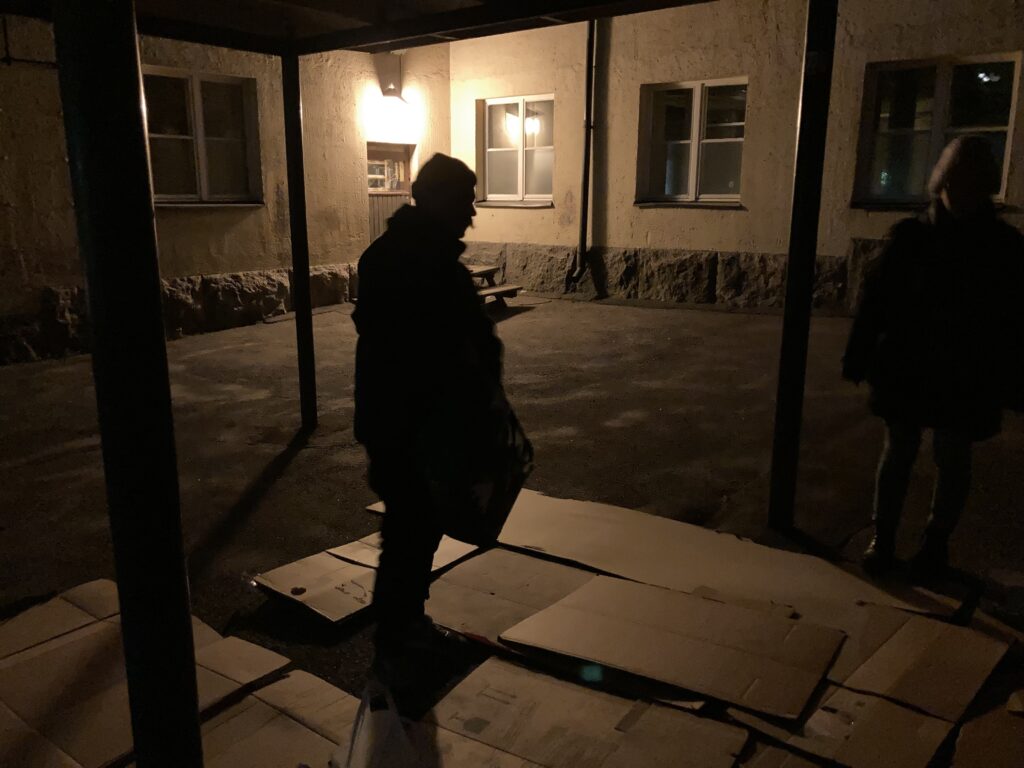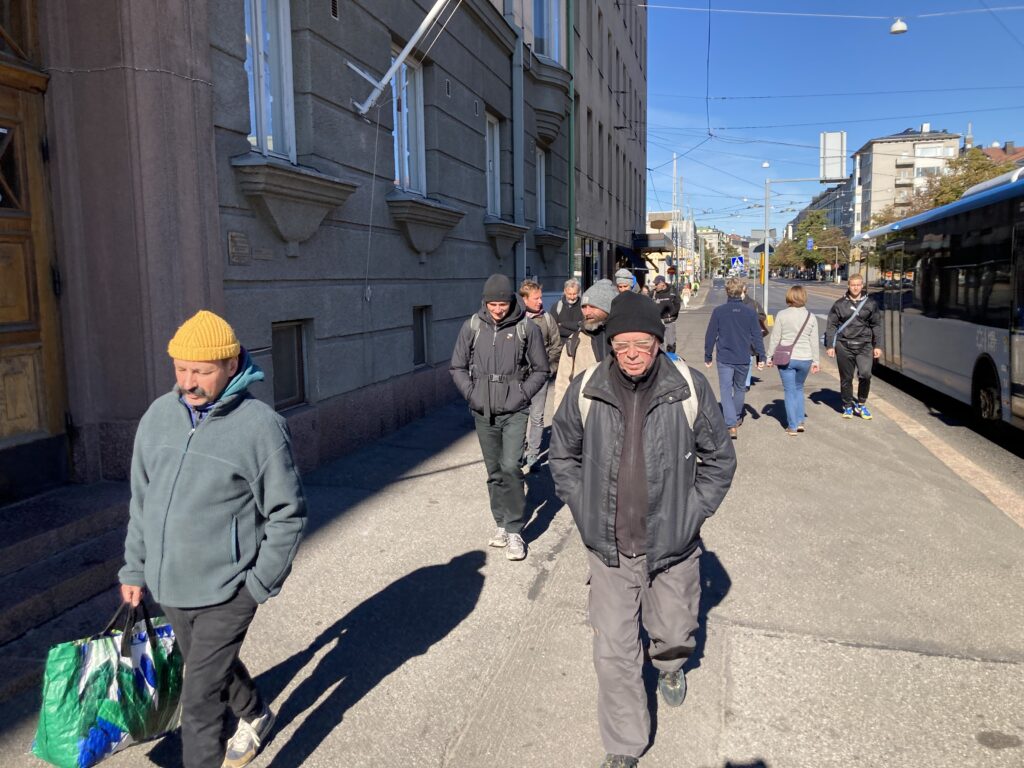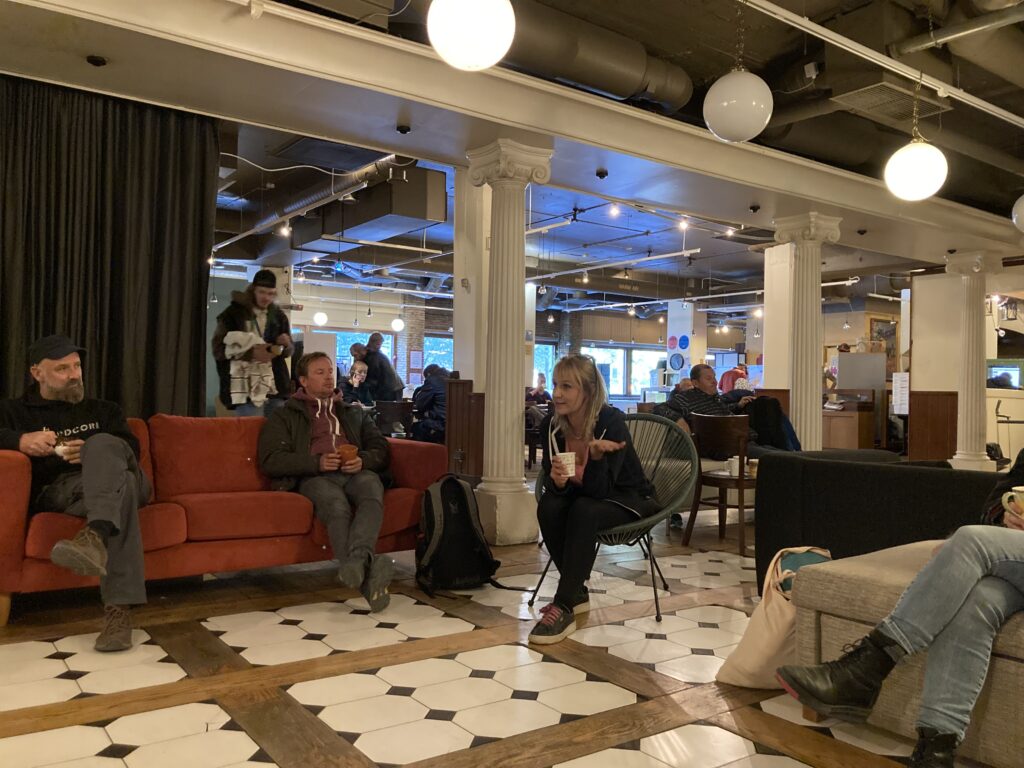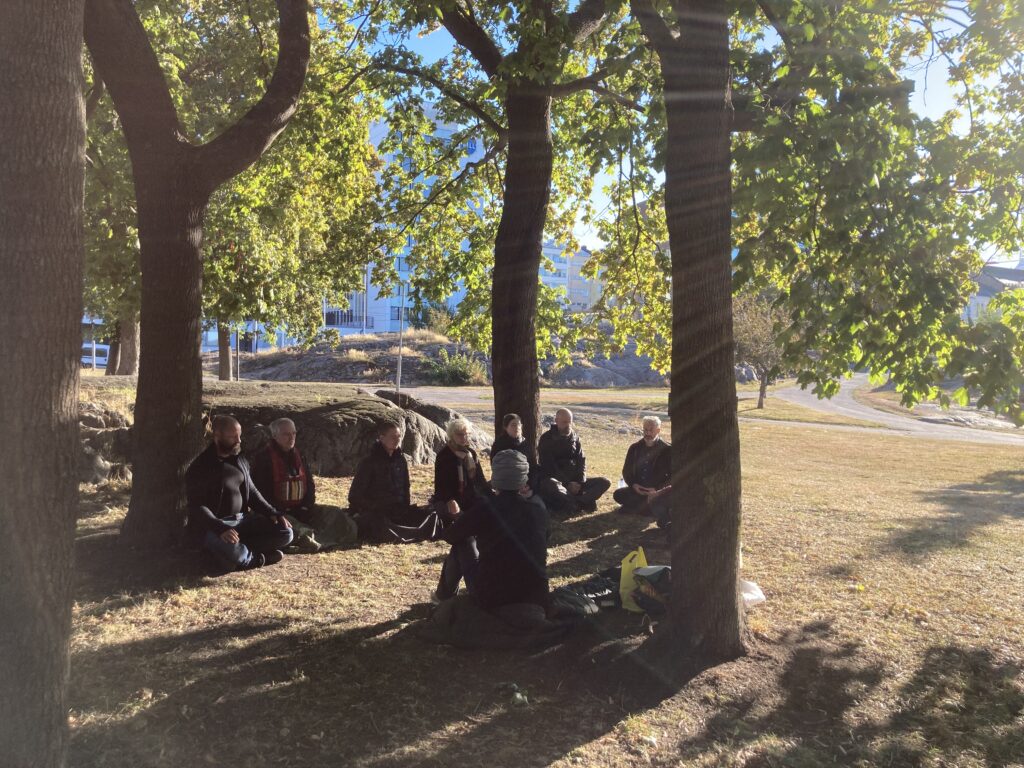Helsinki, Finland Street Retreat
7–10 September 2022
A few weeks ago, I lived on the streets for a couple of days with an inter-faith group of Peacemakers in Helsinki. We did this without money, without phones, begging for food, and sleeping on cardboard in parks and abandoned lots. We also visited homeless shelters to bear witness to poverty and tragedy but also the resilience and joy of people who are less lucky than most of us.
A so-called street retreat is not an urban survival game, not a secret millionaire scheme, nor a disaster tourism trip. The essence is not trying to live as a homeless person, let alone faking homelessness, the essence is living on the streets considering the Three Tenets of the Zen Peacemakers of Not-Knowing, Bearing Witness,, and Loving Action. This may sound rather abstract. It did to me anyway. But a street retreat offers many opportunities to put these tenets into practice. I’d like to share some of those.
At the receiving end
On our first day, we met with the group: 11 people from Finland, The Netherlands, Belgium, and France. After we got to know each other and had lunch, we walked down to the water. Mikko, the Finnish organizer of the street retreat, told us to start begging there.
I was filled with dread as soon as I realized that the begging was about to begin. My colleague had told me that she had started paying attention to beggars after I told her about the street retreat. She noticed that most of them looked gruff, but that I would certainly collect lots of money with my friendly smile. I clung on to that thought, while I picked up an empty coffee cup next to a garbage can.
The group spread out. I headed to the waterfront. I had no idea how to beg. Do you sit? Do you stand? Do you approach people? How does this work? When I don’t know something, I check Wikipedia, watch some YouTube videos, Google a bit, and maybe buy a book – preferably a thick one by a renowned author – to get to the bottom of it. Why didn’t I buy a book on begging first? How could I be so stupid as to come unprepared? Thoroughness is my middle name. As my thoughts were popping away like popcorn in a microwave, I sat down on my backpack along the walking path. I put my cup in front of me and waited for people to pass. A couple of businessmen passed. They were busy talking. I don’t think they noticed me. Maybe they thought I was just sitting there. Maybe I should try to look scrappier? As the popcorn in my head kept popping, my cup blew away. Man, I suck at begging. I really should have read the book.
There was no traffic on the path. I figured that like any retail business, begging was all about location, location, location. I walked down to the shopping street. There I found myself competing against a begging woman and someone from my group. I walked further and positioned myself under a tree with my cup in front of me. I tried to make eye contact and smile at people. Nobody took notice. They just walked past me. Some glanced at me briefly, but they looked at me with no expression, as if I was a bench or a tree. Occasionally a young girl would smile back at me. They didn’t have any money themselves, so it was safe to smile. The ones with handbags and money wouldn’t smile at me. As they clutched their handbags closer to their bodies, they glanced at me from the corner of their eyes, making sure I wouldn’t approach them. Some men stared me down aggressively. I didn’t know that that was a thing: staring down beggars. I guess if you’re insecure enough, beggars can help you feel more powerful.
But that wasn’t too terrible. Some people take pleasure in bullying beggars. Frank De Waele Roshi, our Zen teacher, would walk up to people asking for spare change for food.
One guy asked him “How much do you want? 100 euros?”
Roshi said “That is up to you.”
“Do you want 200 euros?” the guy asked.
Roshi said “That is up to you.”
“Do you want 300 euros?”
“You give what you want”
Then the guy reached into his back pocket, pretending to take out his wallet. Suddenly he pointed his finger to Roshi, yelling “Psych”- or “Sike” if you will, the slang for “I fooled you”.
Another member of our group, Emmanuel, was begging when a young woman took 2 euros out of her pocket. She reached towards the cup to throw it in. “Thank you so much”, Emmanuel said. Next, she put the coin the back in her pocket and walked off laughing.
In the end I collected 2 euros and 40 cents. On my way back to the group, I walked past the begging woman. I felt like an imposter. I gave her one euro out of guilt. We had collected 25 euros as a group. My 2.40 euro put me on par with the rest of the group. “Tomorrow I’ll ace it,” I thought. But I never did. I remained a lousy beggar for the rest of the retreat.
Bearing witness is already healing
I read in Bernie Glassman Roshi’s book Bearing Witness that bearing witness in itself is already healing. This became clear to me on our visits to one of the homeless shelters called Vepa. Vepa is in an office building in a business district. The interior however has the vibe of a thrift store meets vintage diner. There is a corner with clothes, a central space set up like a restaurant, and lots of big couches in the back where people can sleep.
Because Vepa is not licensed as a night shelter, they cannot have beds. But as we experienced first-hand, you don’t sleep all that well on the streets, so a soft coach to nap during the day is not a luxury. People can rest at Vepa, eat a warm meal, talk about their problems with a social worker and get support at applying for housing, banking or other services. Because banks and other services treat homeless like crap – we would learn later. If a social worker comes along, they get things done. While other shelters may refuse people who are high or intoxicated, at Vepa anyone is welcome. If you cause trouble you are asked to leave, and you cannot come back until the next day.
We were welcomed by Silja, an outgoing, expressive, warmhearted women early in her forties who works at the place. She had an incredible touch with the visitors of the center – of whom a number looked in pretty bad shape. When someone would be too loud or nasty, she would shut them up, when a visitor was panicking about his backpack that was lost (he had put it down somewhere a minute before but had forgotten about it), she would calm him down, when a visitor was confused, she would hug him and sit down to listen to their story.
In her mid-thirties Silja had been a nurse with two teenage children, living a normal middle-class life. When something traumatic happened, her doctor prescribed her benzos. She got addicted to the benzos and later other drugs and ended up in jail. After jail she had no place to go and ended up as homeless – depressed and full of self-hate. She came to the shelter and started helping out. From there on she picked up her life, she became part of the staff as an expert by experience[1] and she is now working hard to get her nurse licensed back.
While we were trying to wrap our heads around the tragic story of this strong, resourceful, and compassionate woman, she said “It is amazing what you guys are doing.”
“It is amazing what you are doing,” some of us muttered.
“All these politicians who are cutting our budgets all the time, they should also spend a night on the streets, and they would quickly change their minds. Living on the streets is tough. It is amazing that you do this,” she said.
During our four days on the streets, begging for food, eating porridge in shelters, I sometimes felt like an imposter. We were in fact. And I felt bad about it. But all the social workers and volunteers we met, thanked us for doing this. Homeless people live in the shadows, people caring for them live in the shadows as well. By bearing witness to their situation, we acknowledge their hard work. Work which they are seldom thanked for, work that often doesn’t lead to great success stories. Just being there, acknowledging people as they are, is already healing.
A young woman was rummaging in the give-away clothes corner. Silja said the woman would walk away with a couple of coats per week. Nobody needs dozens of coats. She would probably sell them. But at this place no questions were asked. Everyone comes and goes as they are.
“Can we use the bathroom?” we asked. “Sure, the staff bathroom or the visitor’s bathroom?” Silja asked. We didn’t feel too posh for the visitor’s bathroom, so we chose that. “Let me check,” Silja said “I don’t want you to go there if it’s full of blood and needles.”
I was slightly shocked. My evaluation of toilets would include a dirty seat, toilet paper on the floor, an overflowing garbage bin, or poop streaks in the bowl. I never considered blood or needles.
First contact
Before visiting Vepa we had rested in the Arndt Pekurinen’s Park. Arndt Pekurinen was a Finnish pacifist, who was executed in 1941 because he wouldn’t take up arms. With Finland’s neighboring country, Russia waging a war, we felt it was appropriate to sleep there. We went to the nearby Mall of Tripla to get cardboard and food. We got plenty of banana boxes and headed back to the park. There was a homeless man sitting in the park near us.
We performed the liturgy of the Gate Of Sweet Nectar before eating. The homeless man was watching us while moving nervously up and down under the ledge where he had a mattress. We were also keeping an eye on him. Some felt uncomfortable with the homeless man so close to us, we didn’t want to trespass his territory.
We decided that someone would make contact. If he would flip out, we could still leave. If he was okay with us, we would feel more at ease. Mikko, who is Finnish went up to the homeless man. He asked how the man was doing, and that we would be spending the night there. The homeless asked if we were just going to sleep there – he might be worried that we would be drinking and making noise. Mikko said we were just sleeping. “OK, have fun,” he said.
It all felt so instinctive: the apprehensiveness, the desire to check each others intentions, the distance to keep between each other. I’m pretty sure that this is how tribes in ancient times or explorers in more modern times made first contact. It is funny that on the street, when we’re not protected by established social norms anymore, we fall back on these instinctive behaviors. Practicing Not-Knowing, we seem to know well enough what to do. It is also remarkable that the streets, just one meter away from our doorsteps, are a different world.
Now what
I read the news, I watch human interest programs, I hear stories. I’ve been around in this world to know there is poverty and injustice. But not working in the social sector – unlike many other participants – I never bore witness to that side of society. It is well-hidden after all. I do not feel hopeless or depressed, however. I saw more goodness than evil. The evil stems from systemized ignorance and fear. As Silja said: “All these politicians who are cutting our budgets all the time, they should also spend a night on the streets, and they would quickly change their minds.”
A street retreat is also a very raw and direct exercise in Not-Knowing – letting go of fixed ideas about ourselves, others and the world. There is no script for the situations you encounter: how to beg, how to make first contact with an anxious homeless person, how to deal with being at the receiving end of preconceptions, how to deal with a caring mother and nurse who ends up in jail. It is not up to us to judge any of this. Our humanity is the only principle that can guide us here.
The most asked question I got since my return is: what will you do differently? For starters I will make sure to acknowledge beggars, to not look away indifferently. Even if you don’t have spare change on you, you can still nod or a smile. At a deeper level, I think I gained more trust in Not–Knowing.
We were also discussing with our group what concrete actions we would take to help the homeless and poor. We cannot just continue business as usual. A street retreat gets under your skin.
Text: Johan van Mol
Photos: Mikko Ijäs
More about Vepa: https://vvary.fi/in-english/
More about Arndt Pekurinen: https://en.wikipedia.org/wiki/Arndt_Pekurinen





